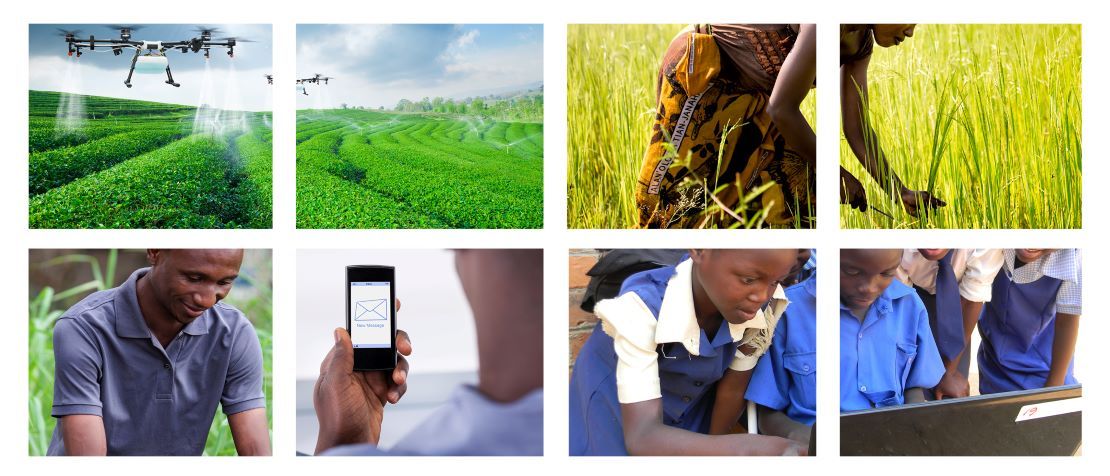
Niger 2.0 – Digital Gateway to Sustainable Development
In collaboration with the Niger National Agency for the Information Society (ANSI), ITU has launched the “Building Smart Villages: A Blueprint” to promote a promising approach to bringing meaningful connectivity and initiating digital transformation in disadvantaged rural communities of low- and middle-income countries. The Smart Village Blueprint, piloted in Niger, is a practical tool for establishing smart villages. It contributes to the implementation of the Niger 2.0 Smart Villages project, which aims to provide broadband infrastructure to improve Internet access in rural and remote parts of the country.
Photographer Sanjay Acharya recently went to Niger to see the Niger 2.0 Smart Village project in action.
Niger in sub-Saharan Africa ranks amongst the lowest in the Human Development Index. Primary health care and basic education are denied to most. Adequate sources of food, nutrition and water are scarce.
The Niger 2.0 Smart Village project has set out to significantly improve the lives of people in rural Niger, achieving clear milestones in meeting sustainable development goals, aiming for significant gains in health, nutrition and education for the population as a whole.
The Nigerien National Agency for the Information Society – ANSI – is at the forefront of this ambitious project leading the national effort to connect rural villages in Niger, in a coordinated “whole-of-government” response.
The Government of Niger, UN agencies such as ITU, WHO, FAO and UNESCO under the One-UN umbrella, along with NGOs, like the Digital Impact Alliance, Université Numérique Francophone Mondiale and Terre des Hommes, have come together to open a new, digital gateway to rural development.
It was my privilege to visit Niger in February 2020 to witness the launch of the Smart Village project in two hamlets east and west of Niamey. The challenges were apparent from the outset: How could the infusion of digital communication technology positively impact remote rural districts where basic resources are severely limited? Could the inhabitants, who have had little or no exposure to ICTs use the technology to make a difference to their daily lives? Could the project actually help meet the Sustainable Development Goals?
At the end of my visit, I came away convinced that significant headway had been made with great promise for the future.
Niger 2.0, the remaking of the nation in the digital age, embodies a holistic and cross-sectoral approach to employ digital technologies to achieve the SDGs, encompassing the needs of all segments of society and ensuring no one is left behind. This ambitious vision envisages the creation of ‘smart’ connected villages across rural habitations in the country.
ITU is helping to coordinate the various stakeholder’s activities and is leading the overall design of the technology platform. Another key role that ITU played was acquiring and deploying satellite VSAT equipment to Niger, a vital mechanism for providing the necessary connectivity to the villages.
One of the ways that the ‘smart’ villages are achieved is through the deployment of innovative apps which have been mounted on tablets as ‘plug-and-play solutions’ which are handed out in rural communities to introduce and support digital education, digital health and digital agriculture.
A local WiFi hotspot links to a micro-server with at least 500 GB of storage that is fed with locally appropriate Wikipedia information and regularly updated. This information can be accessed via the tablets.
Despite the lack of infrastructure and facilities available today, children in Niger are enthusiastic students and keen learners. The new tablets will therefore open the door to distance education and more opportunities.
The apps also encourage the production of food with high nutritional values, such as fruit and vegetables. In addition to the app, and taking advantage of rising mobile-cellular subscriptions – today, half of Niger’s population has a mobile phone – SMS alerts and voice messages are sent out to farmers to inform them about agricultural best practices and advisories on weather and prevailing market prices.
Medical field workers such as nurses, can use the tablets to provide guidance to local health workers using telemedicine and e-health services – a game changer in community welfare. These local health workers can then use the tablet as a reference while evaluating the condition of patients and, if needed, refer cases to doctors in Niamey, using apps like Skype to make a call.
What’s more, access to information is becoming more inclusive and accessible to the community as a whole thanks to an innovative “Talking Book” loaded with pre-recorded information which is available at the tap of a finger.
ITU’s Digital Services programme, in coordination with other UN agencies and the Government of Niger, has set out to firmly turn the information and communication technology (ICT) key to unlock the doors to a new era of sustainable global growth and prosperity in Niger. Excitingly, inhabitants of the villages appear receptive to the new devices, new ideas and to change.
A dedicated webinar will take place on 25 June 2020 from 14:00 to 15:30, Geneva time, to discuss and present the Blueprint. Information about the event, titled “Building Smart Villages: A Blueprint. A comprehensive Whole-of-Government approach for Rural Digital Transformation”, can be found here.
